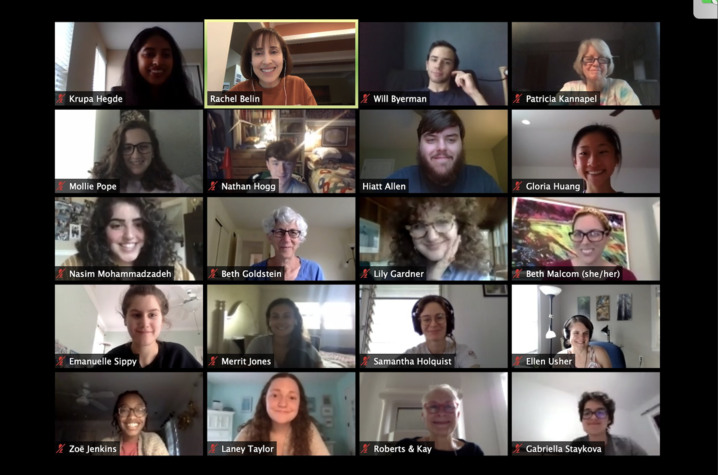UK Faculty Support Statewide Research Study on Pandemic Disruption

A group of high school students studying the impact of COVID-19 on their peers received guidance over the summer from several University of Kentucky faculty members and graduate students.
The Prichard Committee Student Voice Team, in consultation with UK faculty members Ellen Usher, Beth Goldstein and Daniela DiGiacomo, set out to gauge how disruptions caused by the pandemic were impacting students’ academic motivation and learning, as well as their physical, social and emotional health.
Usher is a professor in the Department of Educational, School, and Counseling Psychology and Goldstein recently retired from the Department of Educational Policy Studies and Evaluation, both of the UK College of Education. DiGiacomo is an assistant professor in the UK College of Communication and Information's School of Information Science. Rounding out the team were Calah Ford and Caiti Griffiths, both graduate students in the UK College of Education Department of Educational, School, and Counseling Psychology.
“As students, we understood the dramatic effect school closures had on our education, emotional well-being and home life,” said Gabriella Staykova, a senior at Paul Laurence Dunbar High School in Lexington, who was a quantitative research lead on the project and is now working on her senior research project with Usher. “However, we didn't see any outreach to students about their experiences; no one had a grasp of the statewide student experience during COVID. We knew this information would be critical for understandings of equity and learning during the pandemic and beyond, so we created the survey to learn more.”
The high school students designed their study and analyzed its data with the help of the UK team. In August, the students shared key themes and data highlights they gleaned from the 9,475 middle and high school students who completed the survey across 573 schools and 119 of 120 Kentucky counties.
They found that the COVID-19 pandemic and the interruption to traditional learning environments caused significant behavioral and emotional changes among Kentucky’s middle and high school students.
Student Voice Team member Nyasha Musoni, a senior at Paul Laurence Dunbar High School in Lexington, said the UK team provided a professional and critical eye to the work the students did, and also aided in teaching them the skills necessary to analyze their data.
“They took students who had never coded qualitative data before and guided us in doing so for thousands of responses,” Musoni said. “Instead of simply telling us what to do, they explained the stages of the process and allowed us room to work. They talked us through ethics training, insuring that we not only got the proper IRB approval to set up peer interviews but also conducted them in a way that respected ethics guidelines and privacy. Through it all, they allowed us to do the work and took on a supportive role. They were there not only for questions on the study, but for us as individuals.”
The Prichard Committee Student Voice Team consists of 100 self-selected students — middle school through college — who work as education research, policy and advocacy partners in the Prichard Committee’s efforts to improve Kentucky schools.
“It was rewarding to partner with the next generation of researchers to help them with the survey design and analysis,” Usher said. “It’s been an invigorating, in-depth and important partnership that I believe will inform education policy in the state during the upcoming year. Their work shows the power of students to give voice to fellow students and educators in Kentucky.”
The study was funded through a nationally competitive award from the foundation (formerly the Woodrow Wilson Foundation) as part of its Civic Spring Project, in addition to support from other generous funders. The grant proposal was written collaboratively by students, the adult research team and Rachel Belin, who directs the Prichard Committee Student Voice Team.
Read more about results of the coping with COVID-19 student survey at www.prichardcommittee.org/kentucky-students-report-strong-mental-health-impact-of-pandemic-disruption-in-statewide-survey/.
“Above all, the results of this study have demonstrated just how impactful young people are in ensuring a more equitable educational experience for students from every background,” said Pragya Upreti, a junior at Lafayette High School in Lexington. “We've learned that we don't need policy to be able to empathize. We don't need increased funding to just be able to listen. However, we do need to be mobilizing young people to step up from the sidelines and inform change around an education system that's currently illuminating its sheer fragility.”
More from this series Research Support
Credits
Amanda Nelson (College of Education)



